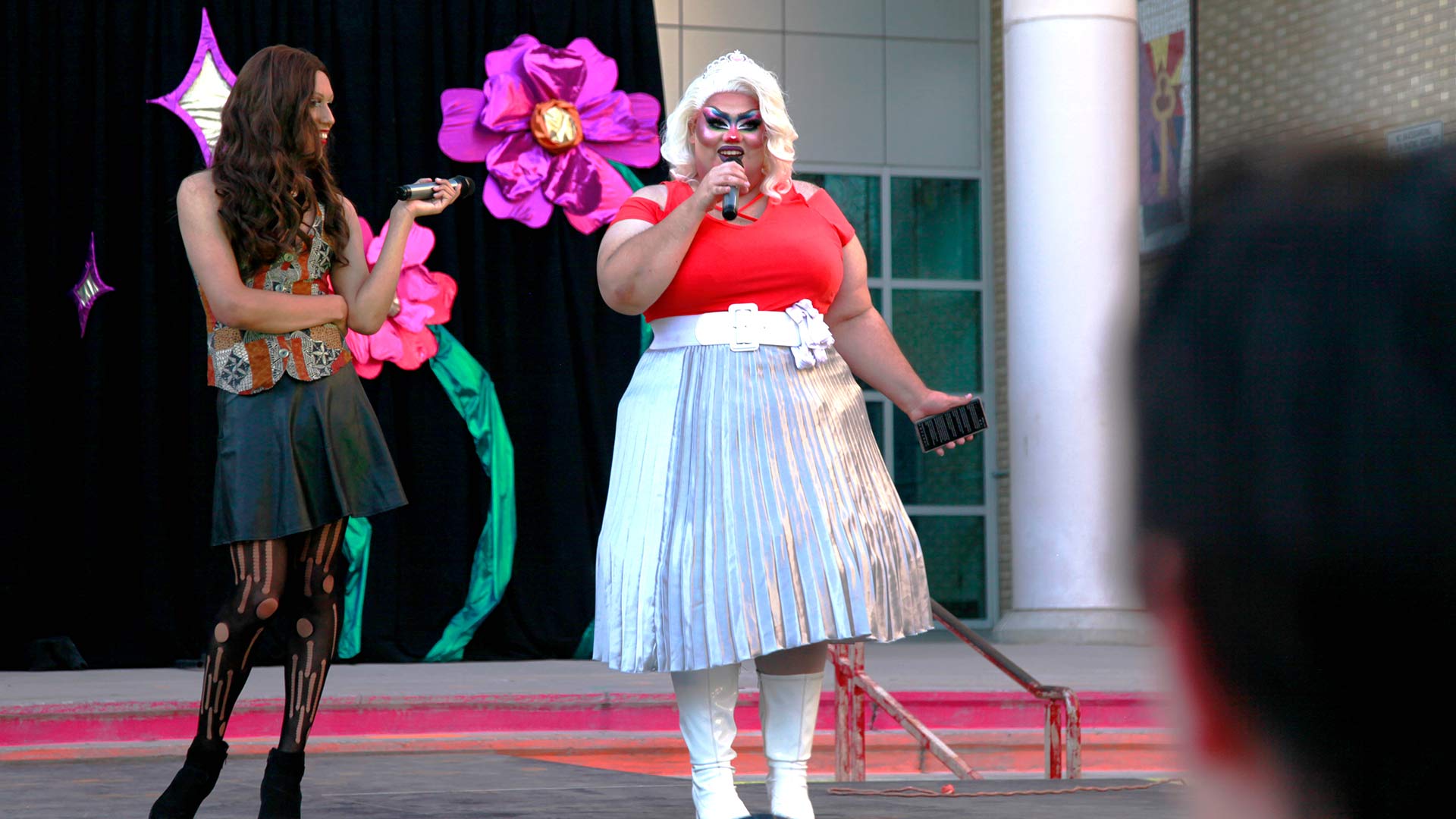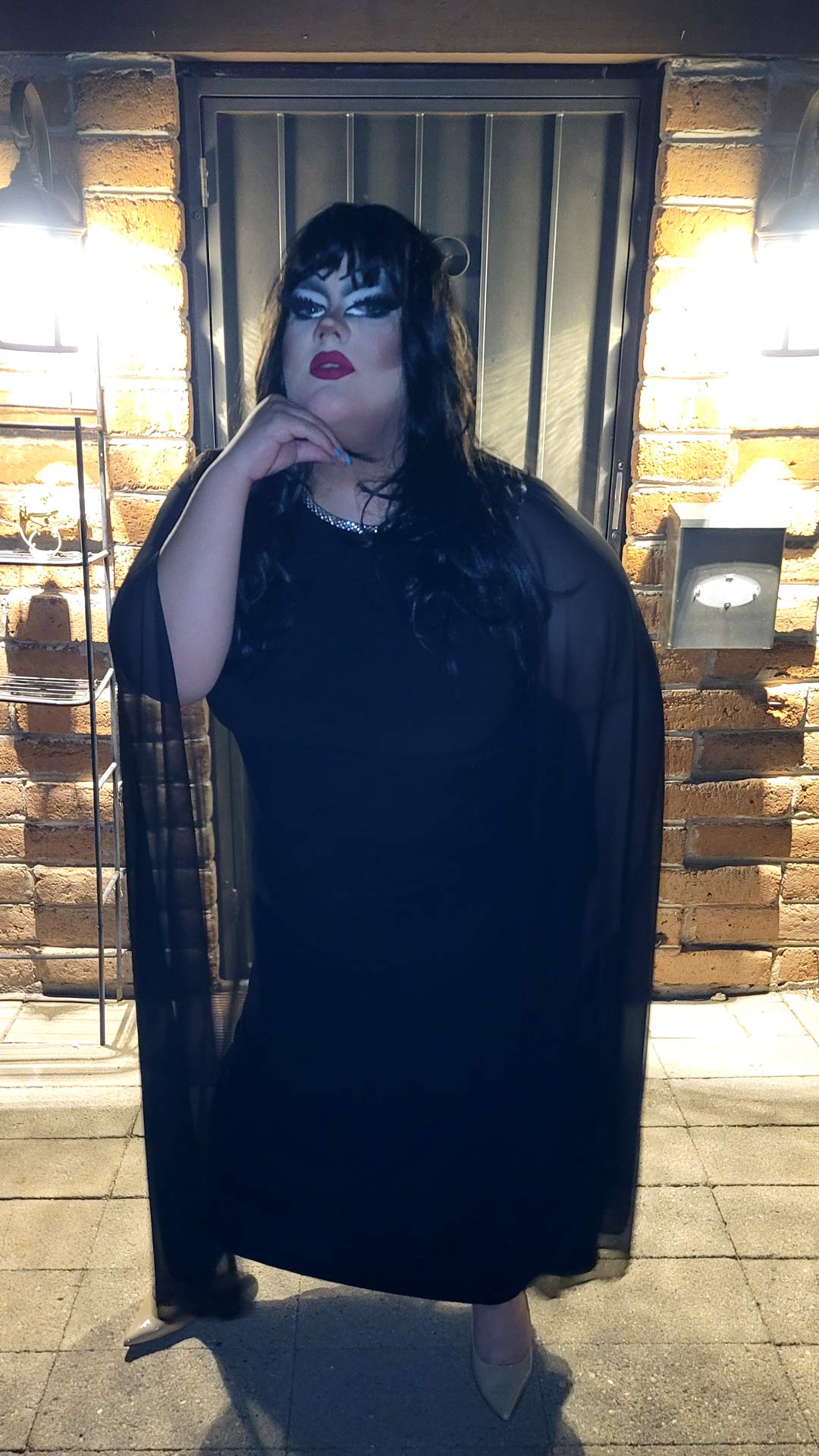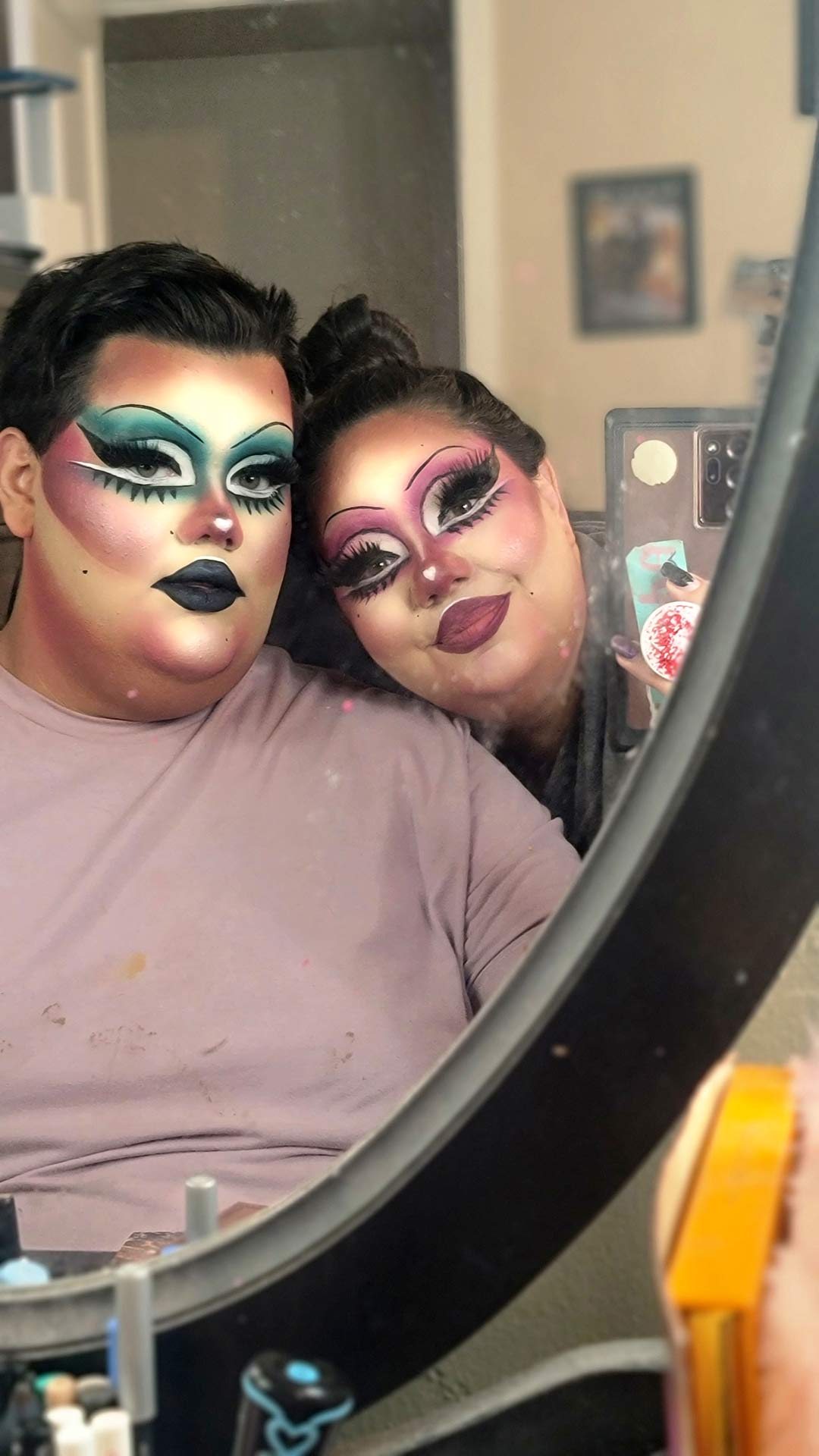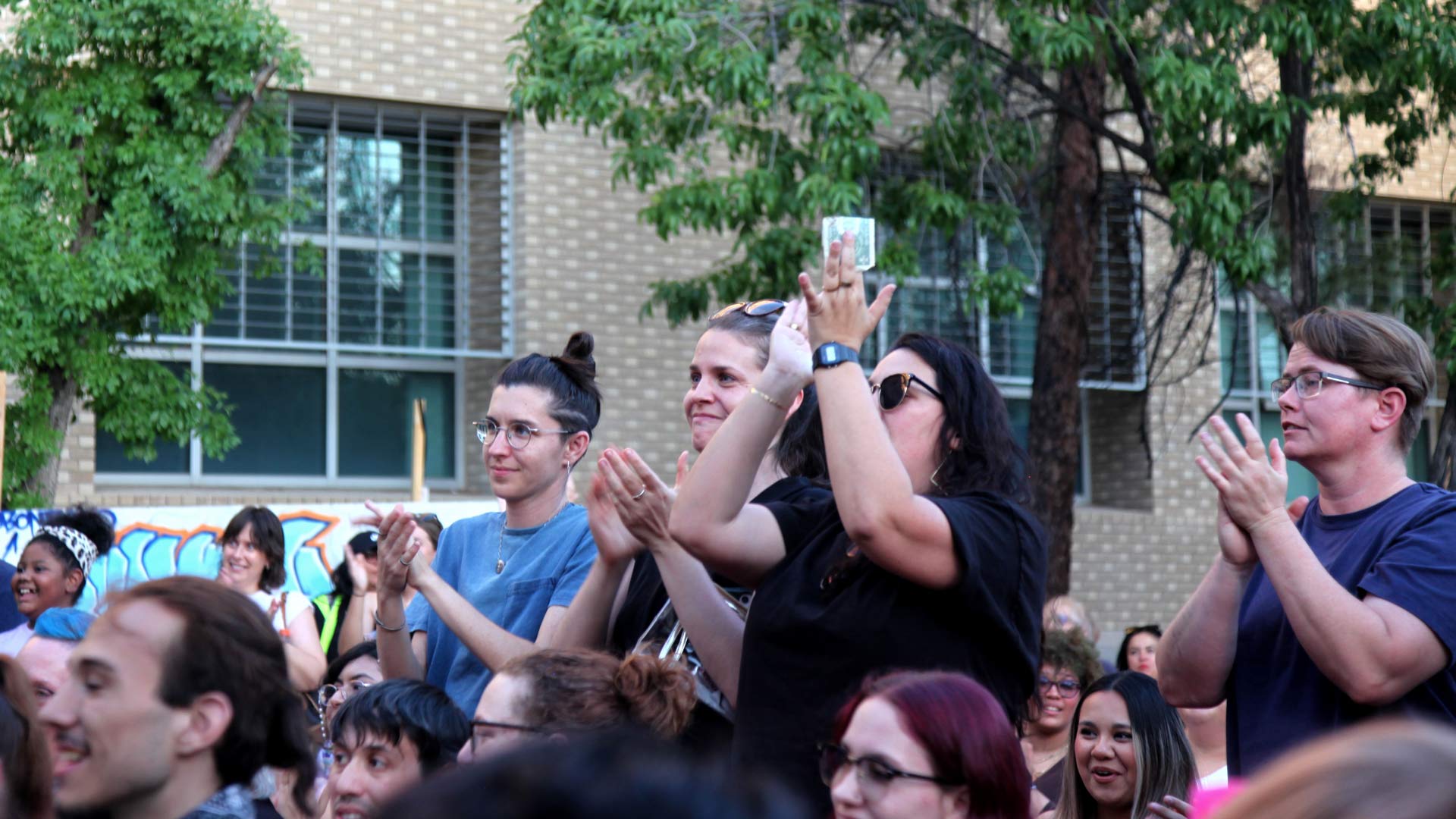 Meggan Mih Blushe, the drag persona of Adrian Molina, is hosting this year's second annual drag show at Tucson Magnet High School.
Meggan Mih Blushe, the drag persona of Adrian Molina, is hosting this year's second annual drag show at Tucson Magnet High School.
The Buzz for July 21, 2023

Drag shows have recently come under fire across the nation as the performance art has become the topic of political posturing. But some drag queens say their work is more than just a showcase. It is a form of self-expression.
Adrian Molina is a recent Tucson Magnet High School graduate, who first discovered drag during the pandemic when he would watch RuPaul’s Drag Race with his mother.
“I just saw the makeup, the outfits, the hair, everything, and I was like, I want to replicate that.”
His desire to learn makeup quickly turned into a passion for performance.
“I need to go further with this, like, I need to take this makeup, bring it out into the world, but also complete it, like from head to toe, bringing the drag queen out.”
Before he knew it, Molina was performing online, utilizing resources like the School of Drag at the Museum of Contemporary Art in Tucson to develop his skills and find community.
After months of YouTube tutorials about how to glue down eyebrows and learning how to create eccentric looks, Meggan Mih Blushe eventually made her in-person drag debut as Morticia Adams at Molina’s high school homecoming dance. From then on, Molina knew Meggan was here to stay.
 VIEW LARGER Adrian Molina, also known as Meggan Mih Blushe, dressed in drag as Morticia Adams for his high school's homecoming dance. This was Molina's first time out in person as Meggan.
VIEW LARGER Adrian Molina, also known as Meggan Mih Blushe, dressed in drag as Morticia Adams for his high school's homecoming dance. This was Molina's first time out in person as Meggan. As they say, it takes a village to raise a child, so Molina’s efforts to bring Meggan to life did not go unsupported. Theresa Reyes, Molina’s mom, is a single mother of three. While it was always a balancing act to be present for each son, she always found a way to support her children in every way possible.
However, Reyes knew early on that Molina was different from her other sons. At a young age, Molina was always drawn to hobbies that were not seen as very masculine, like playing with barbies. In fact, as Reyes recalls, Molina would even avoid activities like football.
“I turned over and Adrian was standing right on the edge of where the players were,” she said. “He was facing the cheerleaders and–in just his whole football uniform–he was just cheering along with them. And I remember I was just like this kid has no business in this place. This is not him. It's not him.”
From teaching Molina how to clasp a bra to showing him the trick to not ripping tights, Reyes never questioned being there for Molina.
“It's a bonding experience. It's something that me and him can share together,” Reyes said. “Those are memories that we have. I just view it the same way as I would support any of my other kids.”
 VIEW LARGER Adrian Molina (left) and Theresa Reyes (right) pose for a photo after Molina finished putting their drag makeup on.
VIEW LARGER Adrian Molina (left) and Theresa Reyes (right) pose for a photo after Molina finished putting their drag makeup on. She was there for every moment, from practice to performance. But, most notably she was most proud of her son when he organized his school’s first annual drag show last year.
“He’s leaving his legacy there,” Reyes said.
With standing room only left, the new tradition of Tucson Magnet High School’s drag show carried into this year.
 A crowd begins to give a stand ovation for a drag performance at Tucson Magnet High School in April 2023.
A crowd begins to give a stand ovation for a drag performance at Tucson Magnet High School in April 2023.
“We got to show that queer people are there,” Molina said. “We need our community...just as much as the football team gets to put on their game, we need to be able to do the same thing. We need to be able to have a space and a time for us to just let loose and show all of our queerness.”
Yet, not everyone in the Tucson community shared the same sentiment that Molina carried. Some residents went to Tucson Unified School District governing board meetings to express the need to stop such an event from taking place on district property. Those who shared concerns argued that these types of events are sexually explicit, perverse and inappropriate for children.
“We don’t allow kids into strip joints. We don’t allow them into x-rated movies, so it is foreign to me as to why we would allow this to go on,” one parent said during an April 11th school board meeting. “This is not about banning anything. It is about protecting the kids.”
Because of such pushback, Molina and his classmates attended the following meeting to defend the need for their space as well.
“It’s not about the kids because we are the kids,” one student said during an April 25th school board meeting. “We started this club to have a safe space, to be able to learn and go about our history and our community together. We planned the drag show as a way to express ourselves through art.”
While the showcase still took place with immense community support in the audience, Molina believes that the stereotypes being pushed are just a symptom of the ongoing attack on drag.
“It's more than what it looks like,” Molina said. “It's not just a ban on drag. It's a ban on a whole community. A whole like, existence of a being.”
During the 2023 legislative session, there have been 492 anti-LGBTQ bills across the United States, according to data from the American Civil Liberties Union. 11 of those bills are in Arizona. Governor Katie Hobbs has vetoed six already and is expected to veto the rest.
But in the midst of political othering, Molina believes that drag can still serve as a learning space for someone who is unsure of their gender expression or identity, like himself. Molina always knew he was queer from a young age, but he never felt confident enough to go out in public in the way he wanted to. That was until Meggan came around.
“It helps me realize I can be confident out of drag,” he said. “I feel better about going out with makeup on–that's not drag makeup, but like boy makeup, and dressing and using different articles of clothing that don't really align with my assigned sex at birth.”
Growing academic research has found that gender identity and expression fall on a spectrum. In the eyes of Molina’s mom, Reyes, drag allows for people to explore new parts of themselves in a mostly binary world.
“There's all these boxes of identity and about how our genders are and what roles we fit with each gender and how each gender should be,” Reyes said. “Drag queens break through all of that, and they teach us that it doesn't have to be that way. That you can be this or you can be that or you can be everything that you want to be.”
Molina argues that Meggan changed his life for the better.
“If I have not done drag, then I don't know. I've never thought about that. I can't imagine a life without drag. It's crazy.”
But the reality of today’s climate creates concern for Molina’s mom, Reyes.
“It's not that it's because they're trying to protect the kids but my son's a kid. I mean, what does that mean for him?”
However, Reyes recognizes the impact her son is leaving behind through actions like helping organize his school’s first drag show.
“He's leaving his legacy there and he'll forever be known as Tucson High’s drag queen…which makes me sad, because there's Queens before him…but there wasn't a space for them to be able to express themselves…There's so much that we've missed out on and so many beautiful performances, and so many beautiful personalities that we could have gotten to know, had they been able to have the opportunity to express themselves.”
This reality and stories they’ve heard from other drag queens have solidified the importance of acceptance to Reyes.
“I always turn to him and I'm always like, I just want you to know that you're loved, you're accepted,” she said.
Now that Molina has graduated high school, his next plan is to go to school to study fashion design with the hope to do drag as a profession and maybe one day compete on RuPaul’s Drag Race. But for now, he has one piece of advice for those curious about drag.
“Push yourself into the community because it's a pretty fun one.”
The Politicization of Identity
Debates around the treatment and rights of those who do not conform to gender norms have made their way to congressional floors across the country, including Arizona.
Bills targeting sex education in schools, gender-affirming healthcare for youth and the use of preferred pronouns in schools are just a few of the types of legislation that Hobbs has vetoed.
Political scientist and author Dr. Lara Brown has examined the use of division for political gains. Campaigns are often about dividing the electorate in a way that the majority is on one candidate’s side. However, Brown says the use of identity as a campaign issue only helps republicans split conservative voters.
“Over the last year there has been this kind of renewed effort in focusing on anti-LGBTQ rights and initiatives to make sure that their evangelical base stays committed to the Republican Party,” she said.
She believes that this movement started from Supreme Court Justice Clarence Thomas’s concurring opinion in the Dobbs v. Jackson case, which overturned the constitutional right to abortion. In his opinion, Thomas suggested that rights like access to contraception and gay marriage should be reconsidered since those issues tackled individual privacy.
“When you look at that opinion, and then you also analyze the QAnon sort of conspiracy theories about pedophilia, and the over sexualization and grooming of children that has animated so much of the MAGA base, there is a reality that Republicans have now found kind of their new set of agenda items to go after individuals in this country,” she said
But, when looking on a national scale, Brown says this type of campaigning does not always appeal to the larger electorate. Take for example Arizona.
“We know that a substantial portion of the swing in Arizona is actually in Maricopa County itself, because Phoenix has grown so much,” Brown says. “Individuals who are living close to urban centers are for the most part more, I would argue, socially tolerant. They may be individually conservative, but they are also more willing and accepting of differences because when you live near a city center. Cities are diverse places.”
Brown says that when understanding issues across the nation, if topics like the economy begin to fall on the national agenda, then candidates need to start looking for other issues.
“What the Republicans appear to have found over the last couple years is really abortion rights and gay rights.”
Though, according to Brown, Republicans believe this type of campaigning will work in the general election and actually encourage turnout among their base.
“I think they believe that even if they're being combative, or exclusionary or even bigoted, that that will not pose problems for them in terms of their base,” Brown said. “I don't think that they have yet really weighed what it means for independents in the suburbs, who are more educated and are really offended by these kinds of messages.


By submitting your comments, you hereby give AZPM the right to post your comments and potentially use them in any other form of media operated by this institution.